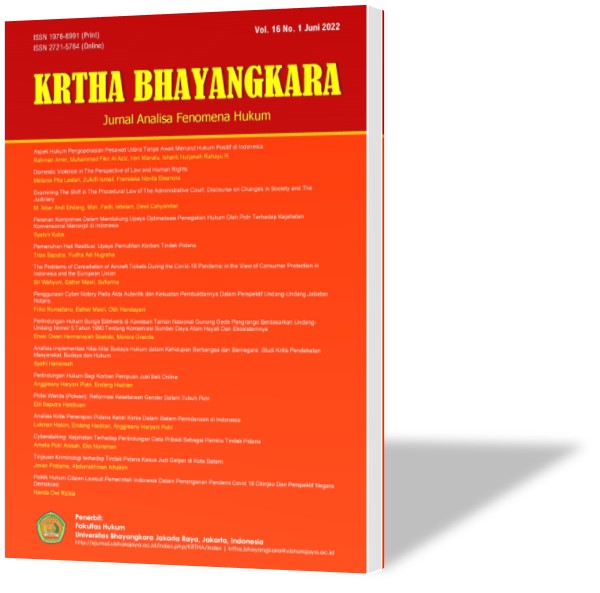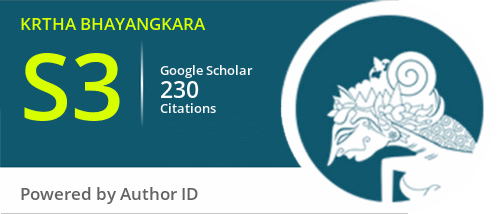Fintech dan Bitcoin Modus Pencuci Uang Hasil Korupsi
DOI:
https://doi.org/10.31599/krtha.v17i1.816Keywords:
fintech, bitcoin, money laundering mode, formulation of forms of money launderingAbstract
The emergence of Fintech (financial technology) has shaken up the world of financial services. Thanks to technology, it has not only improved the quality of financial services but also their reach. However, Fintech is also vulnerable to abuse, such as money laundering crimes. This proves that the mode has morphed into an increasingly sophisticated direction as technology and information advances. Money laundering is an act of concealing or disguising the source of funds, so that funds that previously came from criminal acts, for example the proceeds of corruption, appear to come from legal economic activities. This qualitative research uses the latest secondary data relevant to the theme, aims to describe the phenomenon of the rise of money laundering resulting from corruption using the fintech & bitcoin mode. The results show that it is appropriate to use Fintech & Bitcoin as a means of laundering money resulting from corruption, either as a mode or from the money laundering stage, it is in accordance with the nature of Fintech & Bitcoin which is private or respects the confidentiality of the parties, which can result in criminals being able to hide or disguise the origin, sources of illegal funds in Fintech & Bitcoin. A series of new modus operandi that emphasize security, speed, and privacy from the advantages of Fintech & Bitcoin are chosen by perpetrators to disguise their tracks in cyberspace.
References
Buku
Dorfleitner, Hornuf, Schmitt, and Weber. Fintech in Germany. Switzerland: Springer Nature, 2017.
Garnarsih, Yenti. Penegakan Hukum Anti Pencucian Uang Dan Permasalahannya Di Indonesia. Jakarta: Rajawali Press, 2016.
Sutedi, Adrian. Tindak Pidana Pencucian Uang. Pekalongan: Citra Aditya Bakti, 2008.
Syahroni, Maharso, and Tomy Sujarwadi. Korupsi, Bukan Budaya Tetapi Penyakit. Deepublish, 2018.
Jurnal
Ardiano, Chandra, and Nur Rochaeti. “Analisis Yuridis Kriminologis Penggunaan Mata Uang Elektronik Bitcoin Sebagai Sarana Tindak Pidana Pencucian Uang.” Diponegoro Law Journal 11, no. 1 (2022).
Emirzon, Joni. “Bentuk Raktik Dan Modus Tindak Pidana Pencucian Uang.” In Seminar Nasional Hukum Bisnis/Ekonomi Fakulta Hukum Universitas Sriwijaya. Palembang, 2017.
———. “Hukum Bisnis Indonesia.” Kajian Hukum dan Bisnis (2002).
Irianto, Sulistyowati. “Metode Penelitian Kualitatif Dalam Metodologi Penelitian Ilmu Hukum.” Jurnal Hukum & Pembangunan 32, no. 2 (2017): 155–172.
Jaishankar, Karuppannan. “Establishing a Theory of Cyber Crimes.” International Journal of Cyber Criminology 1, no. 2 (2007): 7–9.
Setyawan, Imam Dwiky. “Pencegahan Tindak Pidana Pencucian Uang Pada Financial Technology Selain Bank Perspektif Undang-Undang Nomor 8 Tahun 2010 Tentang Pencegahan Dan Pemberantasan Tindak Pidana Pencucian Uang.” Universitas Islam Negeri Syarif Hidayatullah Jakarta, 2018.
Utami, Suci. “Tindak Pidana Pencucian Terhadap Uang Virtual Money Laundering on Virtual Money.” Al-Adl : Jurnal Hukum 13, no. 1 (2021): 1–27. https://ojs.uniska-bjm.ac.id/index.php/aldli/article/view/4224.
Peraturan Perundang-Undangan
PBI. Peraturan Bank Indonesia No 18/40/PBI/2016 Tentang Penyelenggaraan Pemprosesan Transaksi Pembayaran, 2016.
———. Peraturan Bank Indonesia Nomor 19/12/PBI/2017 Tentang Penyelenggaraan Teknologi Finansial, 2017.
Sumber Internet
Sihombing, Erwin C. “Modus Baru: Hasil Korupsi Berputar Di Pasar Modal, Kripto Dan Aset Virtual.” Inilah.Com, December 29, 2022. https://www.inilah.com/modus-baru-hasil-korupsi-berputar-di-pasar-modal-kripto-dan-aset-virtual.
“7 Jenis Fintech Yang Berkembang Di Indonesia.” Alpha JWC Ventures, 2023. https://www.alphajwc.com/id/jenis-fintech-di-indonesia/.
Downloads
Published
Issue
Section
License
Copyright (c) 2024 Amalia Syauket, Jantarda Mauli Hutagalung, Muhammad Andi Prastio

This work is licensed under a Creative Commons Attribution 4.0 International License.



































